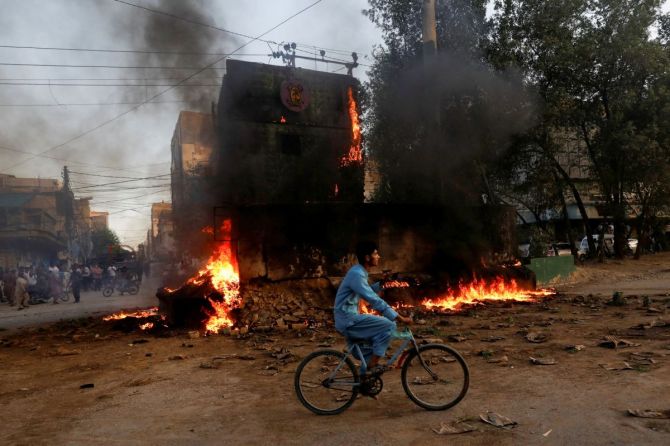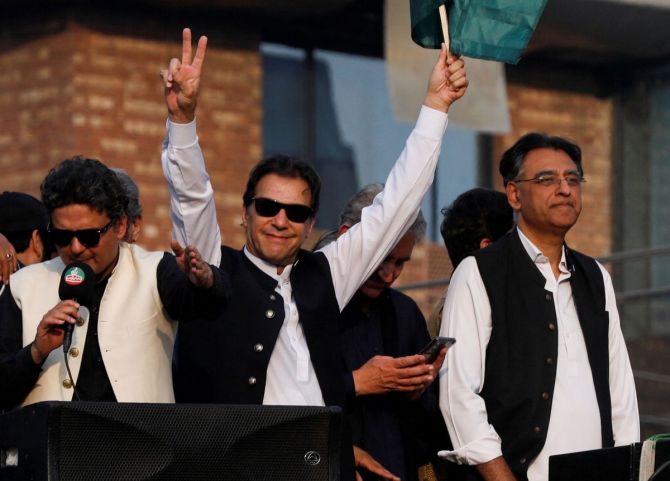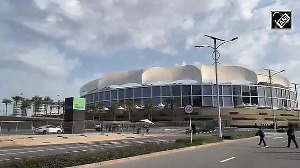'...The more the Pakistan army becomes weaker, then there is every possibility that terrorist groups may create more anarchy in Pakistan.'

Former Intelligence Bureau Officer Avinash Mohananey, who spent a considerable time in Pakistan on security assignments, discusses the turmoil in the country after former prime minister Imran Khan's arrest on May 9.
"Going by the power that the army wields, the dirty tricks that the army can indulge in, Imran Khan will be on the receiving side," Mohananey tells Prasanna D Zore/Rediff.com. The first of a two-part interview:
Why would Imran Khan be arrested at this time?
As of now, Imran Khan is the most popular leader in Pakistan. If Imran Khan is allowed to be free, or, if early elections are held as he desires (in Pakistan) or in the Punjab province, which the supreme court of Pakistan has also ordered, then certainly Imran Khan is going to come out a victor.
Once he assumes power, it is very likely he will treat the army very shabbily and send Opposition political leaders to prison.
That's what he did in his first term (as prime minister) too. It's very difficult to pin him down, and that's what happened after his arrest yesterday (on May 9) evening when they (the Pakistani Rangers) arrested him from the court (in Islamabad).
How could Imran Khan run down the Pakistan army and yet survive when he was prime minister given the military's overarching influence in Pakistan?
The problem is that the people of Pakistan are so fed up with their day-to-day lives, that anyone who could give them assured relief will be regarded as a messiah or the great leader.
Whatever hope the Pakistani people see today in the sanctity of the democratic process rests on the shoulders of Imran Khan.
The (Pakistan) army in the past has been involved in domestic politics and every time when it took over, it was welcomed wholeheartedly but within a few months it would become the most hated object of the people.
They have created a huge structural mess and besides -- and this is unique to the Pakistan army -- they openly grabbed all prime land, the prime real estate in that country and distributed to their own officers.
Depending upon their ranks, these officers would get one, two, three or four plots (the higher the seniority, the higher their share of the prime real estate in Pakistan).
The land is developed at the cost of taxpayers' money and when prices appreciate they sell off a couple of these plots and construct palatial houses for themselves on the rest.
So the people perceive their army as the biggest land grabbing machine in Pakistan. Most Pakistanis detest the army for exactly this reason.
By taking on the army like no other political leader before, Imran Khan became the darling of the Pakistani middle class and he used this popular support to leverage his opposition to the Pakistan army and become a sort of messiah in the country.
Is that the reason why after Imran Khan's arrest on the evening of May 9 the protestors's first attacks were targeted at the army?
Imran Khan's following is largely among the middle class and that too in urban areas. The first visible sign of the army's presence is the corps commanders in Lahore and the GHQ (army's General Headquarters) in Rawalpindi, both populous cities.
During such violence, the protesters always attack the most visible symbol of corruption, decadence and absolute power.
The houses of the corps commanders in Lahore and Rawalpindi represent the brute power the army uses to usurp wealth and hence became the very first targets of violent protesters.

Is the Pakistani middle class leading the violent protests against Imran Khan's arrest?
By the Pakistani middle class I meant the lower middle class, the middle-middle class as well as the upper middle class. The army and the sprawling military industrial complex it has built form the elite Pakistani establishment.
Like India, the Pakistani middle class too has seen burgeoning growth and they form the core of the ardent supporters of Imran Khan's style of politics.
This middle class wants Imran Khan to succeed (in crushing the army's undue influence in all walks of their lives); they bought his narrative.
However, Imran Khan is lucky that the Pakistan army got him removed from power a year ago. If he had continued in power, he would have faced the same music that these people (the Pakistan army) are facing now.
One must acknowledge that Pakistan is facing a structural economic, social and religious problem since its inception in 1947.
The balance of payments crisis today in Pakistan is not the creation of Imran Khan or Shehbaz Sharif (the current Pakistan prime minister and former Pakistan prime minister Nawaz Sharif's brother).
Pakistan exports little and its imports are huge in the absence of outflow of foreign exchange, lack of foreign investments. The bulk of foreign exchange Pakistan earns is through remittances from its people in West Asia and the Gulf countries. No country can survive on just remittances.
What's Imran Khan's future after his arrest? Given the country's past, is he likely heading the Zulfikar Ali Bhutto way?
This is too far-fetched and Imran Khan is surely not heading that way. I can say for sure that battle lines have been drawn between Imran Khan and the Pakistan army.
One of the two sides has to blink first, but going by the power that the army wields, the dirty tricks that the army can indulge in, Imran Khan will be on the receiving side.
There is another interesting aspect to Imran Khan's arrest.
Internationally, he is disliked by the Americans. He's disliked by the Chinese and also the Saudis. All these three countries have been staunch allies of Pakistan.
Given the middle class support for Imran Khan and the violence that we are currently witnessing in Pakistan, can we say that Pakistan is heading towards a civil war?
The more the Pakistan army becomes weaker -- because that is the only institution in Pakistan that works -- and if Imran emerges more powerful in the battle, which just started yesterday (May 9, 2023) evening, then there is every possibility that the religious extremists and terrorist groups may find space to occupy, and may create more anarchy in the already difficult situation within Pakistan.
It (a civil war) is too early to predict, but the direction in which the Pakistan is going is not good.











 © 2025
© 2025